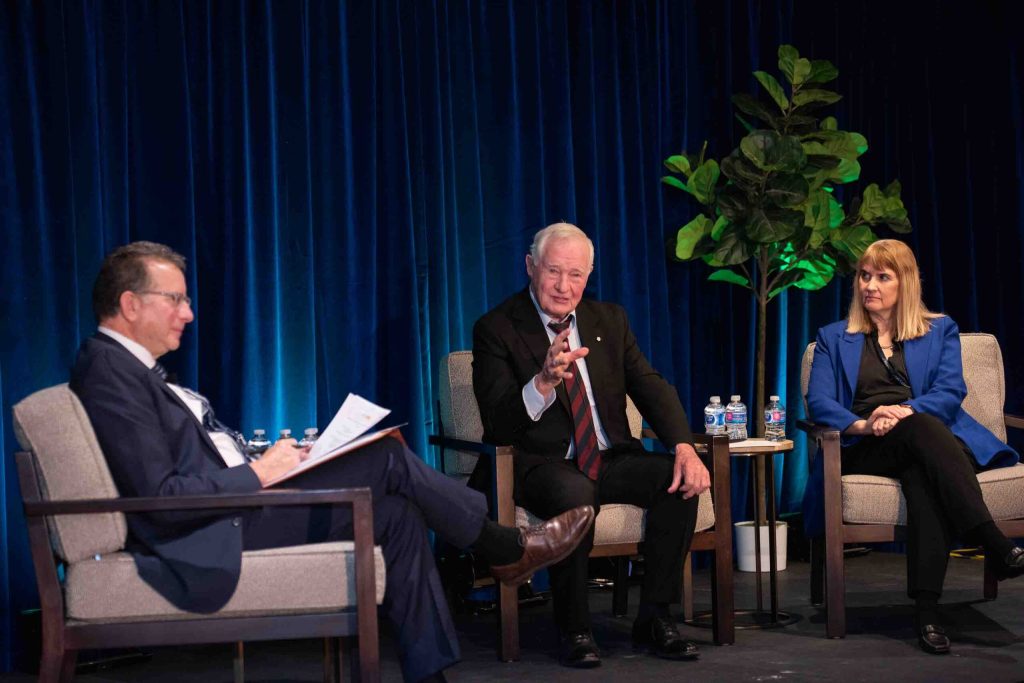Realizing our potential: A conversation on Canada’s economic opportunity

– Photo courtesy the Alberta Securities Commission
Political leaders of all stripes are talking about Canada’s growing economic ambition, emergence as an energy superpower, and how to build for a future shaped by shifting global dynamics.
Will Canada act decisively, realize our potential and build a stronger future? That was the question that underpinned the conversations at ASC Connect 2025.
“There’s a lot of things happening globally and domestically in terms of risk,” said Stan Magidson, Chair and CEO of the Alberta Securities Commission (ASC), and Chair of the Canadian Securities Administrators (CSA). “It’s really an opportunity for all Canadians and Albertans to ask ourselves what we can do here to make our mark in terms of advancing both Alberta’s and Canada’s economic agenda.”
Each year, ASC Connect brings together hundreds of business leaders, industry experts, regulators, and entrepreneurs to discuss the critical issues and evolving trends affecting Alberta’s capital market.
This year’s theme was “Realizing Our Potential,” and the urgency behind those words was unmistakable.
Peter Tertzakian, Founder and President of Studio.Energy, crystallized what was at stake on a panel moderated by Deborah Yedlin, President and CEO of the Calgary Chamber of Commerce, that included Mark Parsons, Vice President and Chief Economist at ATB Financial, and Mark Fitzgerald, President and CEO of Eavor Technologies.
“We cannot afford to be skeptical — we have to be committed,” Tertzakian said.

In this new reality, nations may increasingly align strategic industries with state interests, treating commodities, supply chains, and market access as levers of economic policy. Canada finds itself caught between competing major powers, blessed with resources the world needs but often limited by its own hesitation to act boldly, speakers noted throughout the day.
Parsons pointed to the core problem: “If you look at the last decade, and actually the last two decades, business investment per person is below what it was 10 years ago and 20 years ago.”

Alberta’s moment, Canada’s advantage
Despite these challenges, panels throughout the day at ASC Connect also offered good news, reinforcing the theme of realizing our potential.
The foundations of the Alberta and Canadian economies are far stronger than what people might think.
“Alberta has what the world wants,” said Magidson. “The world wants food security, hence the importance of agriculture. The world wants energy, reliable energy, sustainable energy. That’s what we have to offer. And I think what came through loud and clear, today, is that we should reduce all the friction that we currently have as a country in delivering what the world wants.”
Beyond energy and agriculture, panellists also spoke about Canada’s vast reserves of critical minerals essential to the energy transition, as well as advanced manufacturing. Its artificial intelligence (AI) research clusters in Toronto, Montreal, and Edmonton rank among the best in the world. Canada also remains a stable democracy grounded in the rule of law, with one of the most reliable and trusted regulatory environments — including securities regulation in Alberta.
Magidson praised the performance of the CSA and Canada’s securities regulators, noting he was “hard pressed to find a current agency, board, commission, or regulatory body in the country performing [as well].” He made the remarks in a fireside chat with The Right Honourable David Johnston, former Governor General of Canada, and Kathleen Doyle Rockwell, Senior Special Counsel to the Vice Chairs at the ASC.
That regulatory stability, which includes the CSA’s passport system allowing companies to work with a principal regulator while gaining national market access, provides a valuable foundation for growth and investment. Rockwell emphasized the constant focus on investor protection and efficient capital markets that has remained steady even as so many other factors shift.

The discussion about innovation also extended beyond macroeconomic themes to the evolving role of regulation itself.
In the session Canada at the Financial Innovation Crossroads: How should securities regulators respond? Ryan Clements, Director of Advanced Research and Knowledge Management at the ASC, moderated a conversation on blockchain, tokenization, and artificial intelligence with Steve Everett, Chief Commercial Officer, CDS and Head of Post Trade Innovations at TMX Group; Bilal Hammoud, CEO of NDAX; and Michael Thom, Managing Director of CFA Societies Canada.
Clements underscored that regulators are navigating a pivotal moment.
“There are growing calls for Canada to invest and develop its technology sector,” he said. “But as securities regulators, we also have to ensure investor protection and fair and efficient markets and financial system stability. So, in some ways, we’re at a crossroads here, and we have to navigate this appropriately. Our markets are experiencing rapid technological transformation.”
Panellists discussed how collaboration and agility will define success as Canada integrates new technologies into its capital markets.
TMX’s Everett described it as “a call to action” for regulators and industry to move faster together, while NDAX’s Hammoud emphasized the importance of “safe and predictable” pathways for innovation.
Together, these discussions highlighted how regulatory agility and innovation go hand in hand with economic growth.
That same spirit is evident in Alberta, which has retained (and even grown) its talent through economic downturns that challenged other jurisdictions, and its innovation ecosystem continues to grow.
As Calgary Chamber CEO Yedlin noted, venture capital investment in Alberta has increased 25 per cent over the past five years, compared to just five per cent nationally.
Success stories include Eavor Technologies, which emerged from the Creative Destruction Lab (CDL Rockies at the University of Calgary) and is now pioneering advanced geothermal systems with global applications.
The question isn’t whether Alberta, and by extension, Canada, has what it takes. The advantages are real, documented, and in many cases, unmatched globally, panellists shared.

Canada must give itself permission to win
Advantages aren’t enough to win, though. Speakers repeatedly said Canadians need to believe in them and champion them.
Eavor Technologies’ Fitzgerald knows this firsthand.
During his time leading PETRONAS Canada, he watched as global investors viewed Canada as a high-risk jurisdiction.
Without conviction that projects will actually get built, investment flows elsewhere, he said. Without investment, potential stays unrealized. Without realized potential, conviction erodes further.
“If we don’t have the conviction, particularly those of us in the room that are leaders,” Tertzakian said, “then nobody’s going to come here and put their money in.”

Fitzgerald challenged the sometimes-apologetic lens through which Canada has viewed its resource sector.
“I’m not sorry that we are a resource economy,” he said. “I’m not sorry that our economic growth and our economic development, and the future of the next generation is going to be centred on the development of our natural resources.”
That point led back to the opening of the day when former Governor General David Johnston said trust in institutions is critical for success.
“Trust in our institutions comes with trust in individuals, and trust that we build into our businesses, and to our neighbourhoods and to our economy,” he said.

A national moment of truth has arrived
Trust alone doesn’t attract capital or scale companies.
What investors need, Fitzgerald noted, is “certainty and commitment.”
Magidson pointed to how regulators can play a role in enabling. For example, the semi-annual reporting pilot discussed in the final panel discussion of the day demonstrates how regulators can adapt requirements for venture issuers without compromising investor protection, the kind of pragmatic calibration that maintains integrity while reducing burden.
Speakers agreed that innovation capacity has limited impact if growth capital flows elsewhere, and resource advantages matter only when projects move forward.
Tertzakian was clear about the implications: In this environment, being bold isn’t optional‚ it’s a survival requirement.
The room at ASC Connect understood the opportunity before Alberta and Canada, and recognized that the political rhetoric is shifting. What “Realizing Our Potential” actually means is converting what Alberta and Canada have, into what they do.
Will Canada act decisively?
The answer will be written not just in conference rooms, but in budget commitments, project approvals, capital deployments, and the beliefs of all Canadians that this time things are different.
For more information or to replay panel conversations visit the ASC Connect website.
Realizing our potential: A conversation on Canada’s economic opportunity
#Realizing #potential #conversation #Canadas #economic #opportunity







